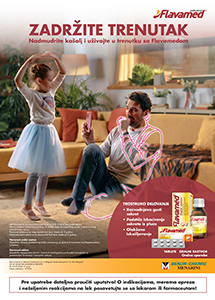WHAT IS PHYSICIAN’S EXPERIENCE ON MANAGING INFANT’S COLIC WITH PROBIOTICS?
Keywords:
infant colics, crying, probioticsAbstract
Diagnosis of infant’s colic is based on Wessel’s rule of three: crying more than 3 hours, at least 3 days a week, for more than 3 weeks. It is described as paroxysmal crying accompanied by leg flexion and gas passing. Appart of proper advise, education and support to mother, parents and caregivers, probiotics are the only products confirmed to have positive effect on colic.
Material and methods: The “Crying and colic” survey was conducted in order to review physician’s attitudes towards the management of infant’s colic with LGG probiotic strain.
Results: We analysed a total of 778 completed surveys from numerous Serbian regions. For all infants with diagnosed or suspected colic 7 drops of Lacobacillus rhamnosus strain was advised. In almost all cases (98.7%) the improvement of symptoms within first five days of treatment was noticed followed by further improvement during consecutive 30 days during Lactobacilus rhamnosus administration.
Conclusion: A positive effect of LGG within the first few days of administration was registered. It is highly recommended to continue for at least 14 days after cessation of problems. Upon reaching a good therapeutic response within first month, it is advised to continue the administration for another two months.
References
Nelson Essentials of Pediatrics - 8th Edition, Elsevier 2019
Wessel MA, Cobb JC, Jackson EB, Harris Gs Jr, Detwiler AC. Paroxysmal fussing in infancy, sometimes called ‘colic’. Pediatrics 1954;14:421-34.
Zeevenhooven J, Koppen IJN, Benninga MA. The new Rome IV criteria for functional gastrointestinal disorders in infants and toddlers. Pediatr Gastroenterol Hepatol Nutr 2017;20:1-13. https://doi.org/10.5223/pghn.2017.20.1.1
Savino F, Castagno E, Bretto R, Brondello C, Palumeri E, Oggero R. A prospective 10-year study on children who had severe infantile colic. Acta Paediatr Suppl 2005;94:129-32. https://doi.org/10.1111/j.1651-2227.2005.tb02169.x
Hemmi MH, Wolke D, Schneider S. Associations between problems with crying, sleeping and/or feeding in infancy and long-term behavioural outcomes in childhood: a meta- analysis. Arch Dis Child 2011;96:622-9. https://doi.org/10.1136/ adc.2010.191312
Sung V, Cabana MD. Probiotics for colic: is the gut responsible for infant crying after all? J Pediatr 2017;191:6-8. https://doi.org/10.1016/j.jpeds.2017.09.010
Sung V, Pärtty A. Chapter 12 The association between intestinal microbiota and infant crying and behaviour. In: Browne PD, Claassen E, Cabana MD, editors. Microbiota in health and disease: from pregnancy to childhood. Wageningen, The Netherlands: Wageningen Academic Publishers; 2016. p. 219-43.
Pärtty A, Kalliomaki M, Salminen S, Isolauri E. Infantilecolic is associated with low-grade systemic inflammationJ Pediatr Gastroenterol Nutr 2017;64:691-5. https://doi.org/ 10.1097/MPG.0000000000001340
de Weerth C, Fuentes S, de Vos WM. Crying in infants: on the possible role of intestinal microbiota in the development of colic. Gut Microbes 2013;4:416-21. https://doi.org/10.4161/ gmic.26041
Gerasimov S, Gantzel J, Dementieva N et al. Role of Lactobacillus rhamnosus (FloraActive™) 19070-2 and Lactobacillus reuteri (FloraActive™) 12246 in Infant Colic: A Randomized Dietary Study.Nutrients. 2018 Dec 13;10(12). pii: E1975. doi: 10.3390/nu1012197
Ong TG , Gordon M, Banks SS, Thomas MR, Akobeng AK. Probiotics to prevent infantile colic. Cochrane Database Syst Rev. 2019 Mar 13;3:CD012473. doi: 10.1002/14651858.CD012473.pub2
Horvath A, Dziechciarz P, Szajewska H. Meta-analysis: Lactobacillus rhamnosus GG for abdominal pain-related functional gastrointestinal disorders in childhood. Aliment Pharmacol Ther. 2011 Jun 1;33(12):1302–10. doi: 10.1111/j.1365-2036.2011.04665.x. Epub 2011 Apr 20.
Chau, Kim et al. Probiotics for Infantile Colic: A Randomized, Double-Blind, Placebo-Controlled Trial Investigating Lactobacillus reuteri DSM 17938. The Journal of Pediatrics, 2015; (166): 74 - 78. doi: 10.1016/j.jpeds.2014.09.020. Epub 2014 Oct 23.





